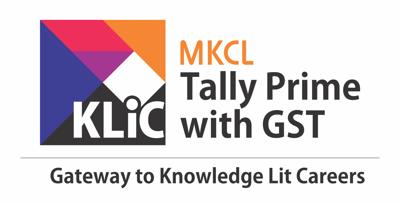- In this course, you will learn to:
- Understand the fundamental principles of accounting, book-keeping, and financial reporting in various types of organizations.
- Gain proficiency in recording, classifying, and summarizing business transactions manually and using accounting software like Tally Prime.
- Learn to create and maintain accounting and inventory records, and generate key financial statements and reports.
- Develop skills to manage banking operations, multi-currency transactions, GST compliance, and inventory processes.
- Build competence in using Tally Prime for managing business processes including purchase/sales order cycles, manufacturing, batch-wise inventory, and cost centre tracking.
- Apply financial concepts to practical scenarios through case studies, reconciliations, and reporting.

Financial Fundamentals
Understand key finance principles including budgeting, cash flow, and financial statements.
Introduction
What you'll learn ?
- At the end of this course, learners will be able to:
- Apply accounting principles and conventions to accurately record and report financial transactions.
- Create and manage accounting masters, inventory masters, vouchers, ledgers, and financial statements in both manual and computerized systems.
- Handle various types of business transactions, including purchase, sales, banking, multi-currency, and GST-related entries, using Tally Prime.
- Prepare and analyze financial statements such as Profit & Loss Account, Balance Sheet, Cash Flow Statement, and accompanying reports.
- Manage inventory operations using stock valuation methods, batch-wise tracking, and manufacturing accounting.
- Reconcile debtors, creditors, and bank accounts, and handle bill-wise settlements effectively.
- Utilize advanced Tally features such as scenario management, budget tracking, cost centres, interest calculations, and price levels for deeper financial insights.
- Generate and interpret reports that aid in business decision-making, including ratio analysis, ageing analysis, movement analysis, and exception reports.
- Apply basic Excel skills for data entry, formatting, and report preparation to complement financial data analysis.
Certification
- KLiC courses are recognised by Yashwantrao Chavan Maharashtra Open University (YCMOU).
- MKCL provides certificate to the KLiC learner after his/her successful course completion.
- Yashwantrao Chavan Maharashtra Open University (YCMOU) provides mark sheet to successfully passed KLiC learners (Jurisdiction: Maharashtra).
Academic Approach
The academic approach of the courses focuses on the “work-centric” education i.e. begin with work (and not from a book!), derive knowledge from work and apply that knowledge to make the work more wholesome, useful and delightful. The ultimate objective is to empower the Learner to engage in socially useful and productive work. It aims at leading the learner to his/her rewarding career as an employee or entrepreneur as well as development of the community to which s/he belongs. Learning methodology:
- Step -1: Learners are given an overview of the course and its connection to life and work.
- Step -2: Learners are exposed to the specific tool(s) used in the course through the various real-life applications of the tool(s).
- Step -3: Learners are acquainted with the careers and the hierarchy of roles they can perform at workplaces after attaining increasing levels of mastery over the tool(s).
- Step -4: Learners are acquainted with the architecture of the tool or tool map so as to appreciate various parts of the tool, their functions, utility and inter-relations.
- Step -5: Learners are exposed to simple application development methodology by using the tool at the beginner’s level.
- Step -6: Learners perform the differential skills related to the use of the tool to improve the given ready-made industry-standard outputs.
- Step -7: Learners are engaged in appreciation of real-life case studies developed by the experts.
- Step -8: Learners are encouraged to proceed from appreciation to imitation of the experts.
- Step -9: After the imitation experience, they are required to improve the expert’s outputs so that they proceed from mere imitation to emulation.
- Step-10: Emulation is taken a level further from working with differential skills towards the visualization and creation of a complete output according to the requirements provided. (Long Assignments)
- Step-11: Understanding the requirements, communicating one’s own thoughts and presenting are important skills required in facing an interview for securing a work order/job. For instilling these skills, learners are presented with various subject-specific technical as well as HR-oriented questions and encouraged to answer them.
- Step-12: Finally, they develop the integral skills involving optimal methods and best practices to produce useful outputs right from scratch, publish them in their ePortfolio and thereby proceed from emulation to self-expression, from self-expression to self-confidence and from self-confidence to self-reliance and self-esteem!
Syllabus
Evaluation Pattern
Evaluation Pattern of KLiC Courses consists of 4 Sections as per below table:
| Section No. | Section Name | Total Marks | Minimum Passing Marks |
|---|---|---|---|
| 1 | Learning Progression | 25 | 10 |
| 2 | Internal Assessment | 25 | 10 |
| 3 | Final Online Examination | 50 | 20 |
| Total | 100 | 40 | |
| 4 | SUPWs (Socially Useful and Productive Work in form of Assignments) | 5 Assignments | 2 Assignments to be Completed & Uploaded |
YCMOU Mark Sheet
Printed Mark Sheet will be issued by YCMOU on successful completion of Section 1, Section 2 and Section 3 and will be delivered to the learner by MKCL.
YCMOU Mark Sheet will be available only for Maharashtra jurisdiction learners
MKCL's KLiC Certificate
The certificate will be provided to the learner who will satisfy the below criteria:
- Learners who have successfully completed above mentioned 3 Sections i.e. Section 1, Section 2 and Section 3
- Additionally, learner should have completed Section 4 (i.e. Section 4 will comprise of SUPWs i.e. Socially Useful and Productive Work in form of Assignments)
- Learner has to complete and upload minimum 2 out of 5 Assignments
Courses Fee Structure from 01 July, 2025 Onwards
KLiC 90 hour course fee applicable from 01 July, 2025 all over Maharashtra
| KLiC Course Duration | MFO (Inclusive of GST) |
ALC Share (Service Charges to be collected by ALC) |
|---|---|---|
| 90 hours | Rs. 750/- | Rs. 4,000/- |
* Above mentioned fee is applicable for all Modes of KLiC Courses offered at Authorised Learning Center (ALC) and at Satellite Center
* Total fee is including of Course fees, Examination fees and Certification fees
* MKCL reserves the right to modify the Fee anytime without any prior notice
